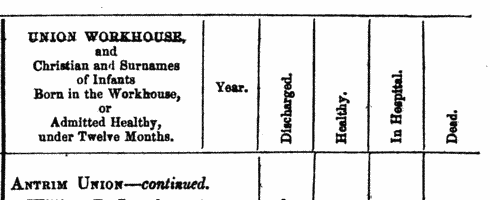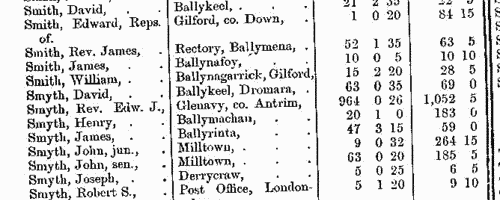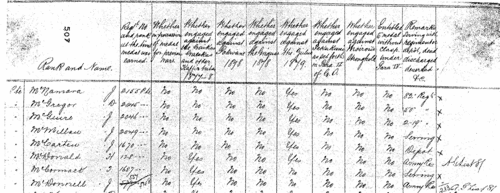Crea Surname Ancestry ResultsOur indexes 1000-1999 include entries for the spelling 'crea'. In the period you have requested, we have the following 10 records (displaying 1 to 10): Buy all | | | Get all 10 records to view, to save and print for £60.00 |
These sample scans are from the original record. You will get scans of the full pages or articles where the surname you searched for has been found. Your web browser may prevent the sample windows from opening; in this case please change your browser settings to allow pop-up windows from this site. Revenue Coast Guard
(1830-1831)
Appointments 11 August 1830 to 11 August 1831:
1a. Return of all persons appointed to situations in the department of the Excise, and of persons nominated as expectants to receive instructions to qualify them to become officers: giving date of appointment or nomination; name; station; salary and emolument.
1b. Return of all persons re-appointed to situations in the Excise: giving name; station in which dropped; salary and emoluments; when and to what station re-appointed; salary and emoluments. This return is split into England, Scotland and Ireland.
2. Return of the different persons appointed to situations in the departments of the Customs: stating port; office; name of officer; when admitted; and salary and emoluments.
3. This return of men appointed to situations in the Revenue Coast Guard: with date of appointment; name; rank; salary; and emoluments.CREA. Cost: £6.00.  | Sample scan, click to enlarge

|  London Policemen
(1830-1842) London Policemen
(1830-1842)
The Metropolitan Police Register of Joiners (MEPO 333/4) lists policemen joining the force through to 31 December 1842 (to warrant number 19892). The register is alphabetical, in so far as the recruits are listed chronologically grouped under first letter of surname. It is evidently a continuation of a similar earlier register, not closed until its alphabetical sections were filled: consequently, there are no entries in this register for the initial letters N, O, Q, U, V, X, Y or Z; and the sections of this register start at different dates - A 18 April 1840 (warrant number 16894); B 11 December 1830 (5570); C 7 September 1830 (4988); D 27 May 1833 (8445); E 15 December 1838 (14476); F 30 March 1832 (7372); G 1 December 1835 (11,184); H 25 April 1832 (7457); I and J 13 February 1837 (12449); K 2 January 1838 (13457); L 3 October 1834 (9905); M 15 November 1832 (7999); P 4 October 1831 (6869); R 4 September 1837 (13021); S 30 March 1835 (10366); T 6 April 1840 (16829); W 30 December 1833 (9096). The register gives Date of Appointment, Name, Number of Warrant, Cause of Removal from Force (resigned, dismissed, promoted or died), and Date of Removal. Although the register was closed for new entrants at the end of 1842, the details of removals were always recorded, some being twenty or more years later. Those recruits not formerly in the police, the army, or some government department, were required to provide (normally) at least two letters of recommendation from persons of standing, and details of these are entered on the facing pages: the names in these are indexed separately - this index refers only to the police constables. Where a recruit was only recently arrived in the metropolis, the names and addresses of the recommenders can be invaluable for tracing where he came from.CREA. Cost: £8.00.  | Sample scan, click to enlarge

|  Staff of the House of Correction at Westminster
(1851) Staff of the House of Correction at Westminster
(1851)
The 1851 census enumerators' books for the mass of the population record the information as in this sample scan. However, there were also separate books for the major public institutions. The instructions for the first column (Name and Surname of each Person who abode in the Institution on the Night of the 30th March, 1851) run: "Write after the Name of the Master or Head of the Institution the Names of his Wife, Children, other Relatives, and Servants; then the Names of the Officers, their Families, and Servants. Commence the list of Inmates for which the Institution is provided on another page." For the second column (Position in the Institution): "State whether the person is the Head, or an Officer or Servant, or the Wife, Son, Daughter, or other relative of such Officer or Servant. If an Inmate, state whether patient, soldier, scholar, &c." For the third column (Condition): "Write 'Married,' 'Widower,' 'Widow,' or 'Unmarried,' against the Names of all Persons except Young Children." For the fourth column (Age (last Birthday)): "For Infants under One Year state the Age in Months, writing 'Under 1 Month,' '1 Month,' '2 Months,' &c." For the fifth column (Rank, Profession or Occupation): "State here the profession, or what is believed to have been the ordinary occupation of the Inmate before admission into the Institution. Carefully distinguish in this column the different kinds of 'laborers,' and those who have been masters in trade from others." For the sixth column (Where Born): "Opposite the Names of those born in England, Scotland, or Ireland write the County, and Town or Parish. If born in the British Colonies, the East Indies, or in Foreign Parts, state the Country; in the last case, if a British Subject, add 'British Subject.'" For the seventh column (Whether Blind, or Deaf-and-Dumb): "Write 'Deaf-and-Dumb,' or 'Blind,' opposite the Name of the Person.'" The House of Correction of the City of Westminster was in the parish of St Margaret and the ecclesiastical district of St Stephen's; in Westminster superintendent registrar's district, and St Margaret registrar's district. There were 21 officers, 8 members of their families, and 6 servants; the institution held 737 prisoners - 245 men and 492 women. HO 107/1480
CREA. Cost: £2.00.  | Sample scan, click to enlarge

| Gentry in London
(1856)
The Post Office London Directory for 1856 includes this 'Court Directory', listing alphabetically by surname and christian name the upper class residents of the capital with their postal addresses. 'In order to afford space for the addresses, the abbreviation "esq." for esquire has no longer been appended to each name in the Court Directory. It should be understood that such should be added to the name of every gentleman in the following pages to which no inconsistent addition is affixed.' Decorations, honours &c. are generally given. Some gentlemen appear who are also listed (as professional men, &c.) in the commercial section. Those with second residences in the provinces usually have the country address given as well.CREA. Cost: £4.00.  | Sample scan, click to enlarge

|  Persons of standing recommending London police recruits
(1843-1857) Persons of standing recommending London police recruits
(1843-1857)
The Metropolitan Police Register of Joiners (MEPO 4/334) lists policemen joining the force 1 January 1843 to 1 April 1857 (warrant numbers 19893 to 35804). The register is alphabetical, in so far as the recruits are listed chronologically grouped under first letter of surname. It gives Date of Appointment, Name, Number of Warrant, Cause of Removal from Force (resigned, dismissed, promoted or died), and Date of Removal. Although the register was closed for new entrants at the end of 1842, the details of removals were always recorded, some being twenty or more years later. Those recruits not formerly in the police, the army, or some government department, were required to provide (normally) at least two letters of recommendation from persons of standing, and details of these are entered on the facing pages. Where a recruit was only recently arrived in the metropolis, the names and addresses of the recommenders can be invaluable for tracing where he came from. Those recruits not formerly in the police, the army, or some government department, were required to provide (normally) at least two letters of recommendation from persons of standing, and details of these are entered on the facing pages: the names in these are indexed here (the police recruits are indexed separately and not included here). Recruits transferred from other forces or rejoining the force did not normally need recommendations - in the latter case, former warrant numbers are given - but some recommendations are from police inspectors, even other constables. Recruits coming from the army sometimes have general military certificates of good conduct, but most often have a letter from their former commanding officer; recruits recommended by government departments (most often the Home Office) similarly have letters from the head of department. But the great majority of the names and addresses in these pages are of respectable citizens having some sort of personal acquaintance with the recruit. Where more than two recommendations were provided, the clerk would only record one or two, with the words 'and others'. Tradesmen are sometimes identified as such by their occupations; there are some gentry. Although the bulk of these names are from London and the home counties, a scattering are from further afield throughout Britain and Ireland. CREA. Cost: £8.00.  | Sample scan, click to enlarge

| Infants in Kilmallock Workhouse, County Limerick
(1872)
Return, “with Christian and Surname of each, of Infants Born in Irish Workhouses, or Admitted thereto when Healthy under Twelve Months Old, and attempted to be Reared therein during the Years 1872 to 1874, showing what has since become of them”. The returns from each poor law union workhouse give: Christian and Surname of Infant Born in the Workhouse, or Admitted Healthy, under Twelve Months; Year; and whether discharged, healthy, in hospital, or dead. CREA. Cost: £6.00.  | Sample scan, click to enlarge

| Freeholders in county Carlow
(1873-1875)
Owners of an acre or more, whether resident there or elsewhere: with their addresses; the acreage; and a valuation of the land. The survey commenced in February 1873, the last returns being received in November 1875.CREA. Cost: £4.00.  | Sample scan, click to enlarge

|  Men of the Royal Artillery fighting in South Africa
(1877-1879) Men of the Royal Artillery fighting in South Africa
(1877-1879)
What is commonly called the Zulu War Medal was awarded to those British soldiers who fought in a series of conflicts in southern Africa from 1877 (the Kaffir War) through to 1879 (the Zulu War). In 1880 the various units submitted returns of the officers, non-commissioned officers and men 'entitled to the Medal for Military Operations in South Africa during 1877-8-9' and these 'medal rolls' are now in the National Archives. The returns are made with the information arranged in twelve columns:
1. Rank and name
2. Regimental number and rank at the time the medal was earned
3. Whether in possession of medal for previous wars
4. Whether engaged against the Gaikas, Galekas and other Kaffir tribes 1877-8
5. Whether engaged against Pokwane 1878
6. Whether engaged against the Griquas 1878
7. Whether engaged against the Zulus 1879
8. Whether engaged against Sekukuni as set forth in Par. 2. G. O.
9. Whether engaged against Moirosi's stronghold
10. Entitled to medal without clasp under Par. 4.
11. Serving with regiment, depot, dead, discharged, deserted, &c.
12. Notes and cross-references to the Adjutant-General's medal lists.
WO 100/46.
CREA. Cost: £8.00.  | Sample scan, click to enlarge

|  Outstanding soldiers of the Grenadier Guards
(1875-1881) Outstanding soldiers of the Grenadier Guards
(1875-1881)
Each year the best soldiers were chosen for long service and good conduct medals. This register gives rank, name, regimental number, and date of recommendation. (The sample scan is from the 34th foot). The register is essentially a register of recommendations, but from 1877-8 onwards there are also details of the issue of the medals. CREA. Cost: £8.00.  | Sample scan, click to enlarge

| County Court Judgments: Middlesex
(1890)
Extracts from the Registry of County Courts' Judgments. These judgments were not necessarily for debt. In some cases they were for damages on properly disputed causes of action, but no distinction was made on the Register. Judgments settled otherwise than through the Court may appear, unless 'Satisfaction' was entered up within the fourteen days allowed for that purpose. These printed extracts include occasional notes giving more detail about certain cases, and also list Satisfactions entered on the Register.CREA. Cost: £6.00.  | Sample scan, click to enlarge

|
Research your ancestry, family history, genealogy and one-name study by direct access to original records and archives indexed by surname.
|













